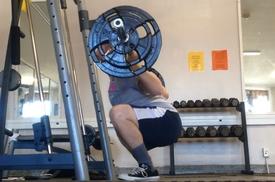Oh Noes! I am eating below my BMR
Options

Sarauk2sf
Posts: 28,072 Member
If you have a reasonable caloric deficit (based on your actual results), and are even vaguely active then, when averaging it out, no you are not. And even if you were, there is no evidence to support that it is an issue in any event. Having a large deficit can well be an issue, depending on the context, and having a very low calorie target may be, due to macro and micronutrient requirements, but eating below your BMR...well, there is no evidence to support that.
Let’s look at the two parts of this equation: food intake and energy expenditure. Your deficit, or surplus, is the difference between your intake and your energy expenditure. Just about every element within these two factors are estimates in practice.
Caloric Intake
No matter how accurately we try to log, we will never be completely accurate with our intake. Food labels are not completely accurate and the actual amounts we consume is not completely accurate.
See here for a further discussion of logging accuracy, which does not even address the inherent and unavoidable inaccuracies when eating out: http://www.myfitnesspal.com/topics/show/872212-you-re-probably-eating-more-than-you-think
Even if you weigh and measure your foods, how many people for example log their coffee, their cooking spray or their artificial sweeteners? These things can add up.
Energy Expenditure
A couple of definitions:
TDEE = Total Daily Energy Expenditure. In other words, your maintenance calories – the intake that you will maintain your weight at. It includes your BMR, your day to day activity and exercise as well as the thermic effect of food (how much energy it takes to digest your food).
BMR = Basal Metabolic Rate. What you expend on your essential functions, basically the energy expenditure you would have at complete rest.
Online Calculators
Many people use the TDEE less x% method to set their caloric intake. Estimators are available online where you can plug your stats in and your estimated TDEE, and usually BMR will be given. These estimators are exactly that – estimators and will not take into account your specific circumstances.
The starting point that the TDEE calculators are based off is your estimated BMR. Contrary to what most people seem to think, this is not *your* BMR. It is based off formulas derived from studies that calculated the BMR of a sample of people and applied that to a formula. Those people do not represent you or your individual circumstances.
To highlight how much of an estimate these are, there are a number of different calculations that are used which will spit out very different numbers, including the Harris-Benedict equation, the Mifflin St Jeor Equation, and the Katch-McArdle Formula. The first two do not take into account BF%.
In addition, and highlighting even more that these estimates are just that, estimates, you need to consider the fact that BMRs vary from individual to individual. The main BMR variability is in relation to LBM, so using the Katch-McKardle formula should take this out of the equation (assuming people even can accurate assess their BF%, which is a stretch). However, when normalizing for LBM differences, studies have shown that there is a variability of up to 30% in individuals not explained by LBM, gender or age differences. Now, the people on the upper and lower ends are a small percentage, but it just highlights the variability and the fact that individuals will not have the BMRs spit out by the calculators.
Other things that can impact someone’s BMR are whether someone is dieting (and how long for and the extent of the deficit), medications, stress, menopause, illness and certain conditions such as thyroid issues and PCOS.
So, with all of the above, do you really think that the number spit out by the calculators is correct? Even if you do, what about the other elements that go into the calculation? The energy expenditure for your day to day activity and your exercise.
The calculators use a multiplier against your BMR to estimate your TDEE. The general rule of thumb is:
Little to no exercise = BMR x 1.2
Light exercise (1–3 days per week) = BMR x 1.375
Moderate exercise (3–5 days per week) = BMR x 1.55
Heavy exercise (6–7 days per week) = BMR x 1.725
Very heavy exercise (twice per day, extra heavy workouts) = BMR x 1.9
So, where do we fall? What about a person with a desk job versus a person who is in construction, or a bike messenger. Add that to how busy, or not, someone is in their life outside work, and the infinite variables with exercise (type, intensity, duration etc), there is no way to get an accurate number for your TDEE. The above is a guideline, not the end result.
Wearable Devices
Wearable devices to estimate TDEE have become very popular. They are a useful too, but that is all they are, a tool, and again, actual results trump their estimates.
As with the estimates of BMR, these do not take into account specifics as to someone’s actual BMR but uses estimates to calculate the TDEE it shows in the reports. It has the same inherent issues as the online calculators with regard to individuality.
As with the above, HRMs have their own set of inaccuracies and are not completely accurate for calories burned for steady state cardio and are definitely not accurate for strength training or day to day activities.
So?
Your estimated TDEE is not accurate. Your estimated BMR is not accurate. Your estimated intake is not accurate. So, when looking to how much you are eating, do not get hung up on whether you are netting below your BMR.
If your actual results result in a loss that is reasonable (for discussions sake, lets say it represents the loss that equates to 20% of your TDEE a week, so for someone with a TDEE of 2,500 calories that would be 500 calories which approximates 1lb a week), and you are at least vaguely active, you will not be netting below your actual BMR. Even if you are sedentary, it is unlikely that you will, and even if you do, it will be only by a small amount. No matter what the calculators say.
Using an example of someone with a BMR of 1,200 who is very inactive, their TDEE will approximate 1,440 calories. The extra 240 calories is from the thermic effect of food, getting up to eat, pee, shower, go to the store etc etc. Taking a 20% cut off this, gives a deficit of 288 calories, which takes you a whole 48 calories below your BMR. Assuming you are trying to lose weight, your BMR will decrease in any event as you do.
Lets take a more common example here. Someone with the same BMR, but who is more active and burns say an extra 300 calories a day, their TDEE would be 1,740. Taking a 20% cut off this gives you a deficit of 348 calories. So, they would eat to 1,392. Well above their actual BMR. Even a cut of a lb a week would keep you above your BMR
Whatever your BMF/Fitbit tells you is your TDEE, whatever the online calculators tell you is your BMR or your TDEE, if you are losing a lb a week on average, your TDEE will be at least (see estimation errors in tracking) 500 calories more than you are estimating your intake at. It is really irrelevant if the online calculator tells you it should be higher. The only real relevance it has in this context is to give someone a red flag that their metabolism may be slower than average and they may want to look into why. In some extreme cases, this may be due to metabolic damage from long term VLC dieting, but in the good majority of the cases, it will not be.
Note that what you actually net to should be looked at over the whole week and not individual days. There is absolutely nothing wrong with having a net below your BMR on exercise days when you use a static number to eat to. You will just be having a higher net the following day for example when you do not exercise, and as we all should know by now, our bodies do not ‘reset’ at the strike of midnight.
In Summary
While useful tools, do not get caught up in the calculators and the devices. Whether you net below what some calculator tells you that your BMR is should be is irrelevant. If your loss over the long term is reasonable, then there is no issue if your actual logged intake, net of estimated exercise calories, appears to be below your BMR, as likely it is not and in any event , even if it were, it does not matter. Actual results trumps any estimation tool.
Let’s look at the two parts of this equation: food intake and energy expenditure. Your deficit, or surplus, is the difference between your intake and your energy expenditure. Just about every element within these two factors are estimates in practice.
Caloric Intake
No matter how accurately we try to log, we will never be completely accurate with our intake. Food labels are not completely accurate and the actual amounts we consume is not completely accurate.
See here for a further discussion of logging accuracy, which does not even address the inherent and unavoidable inaccuracies when eating out: http://www.myfitnesspal.com/topics/show/872212-you-re-probably-eating-more-than-you-think
Even if you weigh and measure your foods, how many people for example log their coffee, their cooking spray or their artificial sweeteners? These things can add up.
Energy Expenditure
A couple of definitions:
TDEE = Total Daily Energy Expenditure. In other words, your maintenance calories – the intake that you will maintain your weight at. It includes your BMR, your day to day activity and exercise as well as the thermic effect of food (how much energy it takes to digest your food).
BMR = Basal Metabolic Rate. What you expend on your essential functions, basically the energy expenditure you would have at complete rest.
Online Calculators
Many people use the TDEE less x% method to set their caloric intake. Estimators are available online where you can plug your stats in and your estimated TDEE, and usually BMR will be given. These estimators are exactly that – estimators and will not take into account your specific circumstances.
The starting point that the TDEE calculators are based off is your estimated BMR. Contrary to what most people seem to think, this is not *your* BMR. It is based off formulas derived from studies that calculated the BMR of a sample of people and applied that to a formula. Those people do not represent you or your individual circumstances.
To highlight how much of an estimate these are, there are a number of different calculations that are used which will spit out very different numbers, including the Harris-Benedict equation, the Mifflin St Jeor Equation, and the Katch-McArdle Formula. The first two do not take into account BF%.
In addition, and highlighting even more that these estimates are just that, estimates, you need to consider the fact that BMRs vary from individual to individual. The main BMR variability is in relation to LBM, so using the Katch-McKardle formula should take this out of the equation (assuming people even can accurate assess their BF%, which is a stretch). However, when normalizing for LBM differences, studies have shown that there is a variability of up to 30% in individuals not explained by LBM, gender or age differences. Now, the people on the upper and lower ends are a small percentage, but it just highlights the variability and the fact that individuals will not have the BMRs spit out by the calculators.
Other things that can impact someone’s BMR are whether someone is dieting (and how long for and the extent of the deficit), medications, stress, menopause, illness and certain conditions such as thyroid issues and PCOS.
So, with all of the above, do you really think that the number spit out by the calculators is correct? Even if you do, what about the other elements that go into the calculation? The energy expenditure for your day to day activity and your exercise.
The calculators use a multiplier against your BMR to estimate your TDEE. The general rule of thumb is:
Little to no exercise = BMR x 1.2
Light exercise (1–3 days per week) = BMR x 1.375
Moderate exercise (3–5 days per week) = BMR x 1.55
Heavy exercise (6–7 days per week) = BMR x 1.725
Very heavy exercise (twice per day, extra heavy workouts) = BMR x 1.9
So, where do we fall? What about a person with a desk job versus a person who is in construction, or a bike messenger. Add that to how busy, or not, someone is in their life outside work, and the infinite variables with exercise (type, intensity, duration etc), there is no way to get an accurate number for your TDEE. The above is a guideline, not the end result.
Wearable Devices
Wearable devices to estimate TDEE have become very popular. They are a useful too, but that is all they are, a tool, and again, actual results trump their estimates.
As with the estimates of BMR, these do not take into account specifics as to someone’s actual BMR but uses estimates to calculate the TDEE it shows in the reports. It has the same inherent issues as the online calculators with regard to individuality.
As with the above, HRMs have their own set of inaccuracies and are not completely accurate for calories burned for steady state cardio and are definitely not accurate for strength training or day to day activities.
So?
Your estimated TDEE is not accurate. Your estimated BMR is not accurate. Your estimated intake is not accurate. So, when looking to how much you are eating, do not get hung up on whether you are netting below your BMR.
If your actual results result in a loss that is reasonable (for discussions sake, lets say it represents the loss that equates to 20% of your TDEE a week, so for someone with a TDEE of 2,500 calories that would be 500 calories which approximates 1lb a week), and you are at least vaguely active, you will not be netting below your actual BMR. Even if you are sedentary, it is unlikely that you will, and even if you do, it will be only by a small amount. No matter what the calculators say.
Using an example of someone with a BMR of 1,200 who is very inactive, their TDEE will approximate 1,440 calories. The extra 240 calories is from the thermic effect of food, getting up to eat, pee, shower, go to the store etc etc. Taking a 20% cut off this, gives a deficit of 288 calories, which takes you a whole 48 calories below your BMR. Assuming you are trying to lose weight, your BMR will decrease in any event as you do.
Lets take a more common example here. Someone with the same BMR, but who is more active and burns say an extra 300 calories a day, their TDEE would be 1,740. Taking a 20% cut off this gives you a deficit of 348 calories. So, they would eat to 1,392. Well above their actual BMR. Even a cut of a lb a week would keep you above your BMR
Whatever your BMF/Fitbit tells you is your TDEE, whatever the online calculators tell you is your BMR or your TDEE, if you are losing a lb a week on average, your TDEE will be at least (see estimation errors in tracking) 500 calories more than you are estimating your intake at. It is really irrelevant if the online calculator tells you it should be higher. The only real relevance it has in this context is to give someone a red flag that their metabolism may be slower than average and they may want to look into why. In some extreme cases, this may be due to metabolic damage from long term VLC dieting, but in the good majority of the cases, it will not be.
Note that what you actually net to should be looked at over the whole week and not individual days. There is absolutely nothing wrong with having a net below your BMR on exercise days when you use a static number to eat to. You will just be having a higher net the following day for example when you do not exercise, and as we all should know by now, our bodies do not ‘reset’ at the strike of midnight.
In Summary
While useful tools, do not get caught up in the calculators and the devices. Whether you net below what some calculator tells you that your BMR is should be is irrelevant. If your loss over the long term is reasonable, then there is no issue if your actual logged intake, net of estimated exercise calories, appears to be below your BMR, as likely it is not and in any event , even if it were, it does not matter. Actual results trumps any estimation tool.
1
Replies
-
This space for sale.0
-
who allowed naked mods in here?
and thank you...reading:flowerforyou:0 -
Excellent post!0
-
Great post and happy 15,000 Sara!0
-
Awesome post!
Everyone thinks that we're playing a numbers game when we're talking about weight loss, but we're really playing a clever guessing game. Everything is an estimation. We have to play around with it to get it just right.0 -
Now THAT'S a 15,000th post!!
Thanks for this!0 -
Excellent read
Also, in for naked mods0 -
Solid read coupled with naked mods makes for a legit 15,000th post, Sara.0
-
Full of excellent.
In for the torsos.0 -
tagging to read later. This sounds sciency and confusing
 0
0 -
Phenomenal read, such a great reminder not to spaz out! Happy 15 000!0
-
solid 15,000th post....0
-
Really great read!
 0
0 -
awesome! bumping to read later
 0
0 -
Done. Read. Even the part about the bod not resetting at midnight. :grumble: Shucks. Perhaps then, it resets at 3am :bigsmile:
Love this 15,000 post & even a tiny shorty-shorts on a mod is o.k.:drinker:0 -
This is quickly becoming my favorite group. :happy:0
-
There you go again, using common sense all over the place:p0
-
This is timely for me, as usual, have been looking at the days where my net has been below my BMR and thinking oops! This is reassuring...0
-
Sensible and useful advice!
Sarah you are looking great on your bulk cycle
It suits you very sexy.
Side steel looking hot too!0 -
This IS my favorite group. By far the most helpful. Thanks Sara and SS.
Tom0 -
Where did the BMR hysteria start from, I wonder... Was someone trying to sell something?
There is a problem with people thinking that you have to eat below your BMR to lose weight, which may just be acronym overdose and confusion between TDEE and BMR. While I agree absolutely that the numbers are all approximations, people do risk their health by eating too little, I guess because they feel more weight lost is better than less.
Would you consider putting this on the main boards?0 -
Brava!
Belongs in the pinned post section, for sure.1 -
To be "headless torsos," E.T.P mods seem to have plenty going on upstairs! Thanks for the awesome post and the continuation of free sound advice!1
-
I've chosen two groups to join here on MFP, E.T.P. and C25k, pretty sure I've found all I will likely ever need!0
-
Where did the BMR hysteria start from, I wonder... Was someone trying to sell something?
There is a problem with people thinking that you have to eat below your BMR to lose weight, which may just be acronym overdose and confusion between TDEE and BMR. While I agree absolutely that the numbers are all approximations, people do risk their health by eating too little, I guess because they feel more weight lost is better than less.
Would you consider putting this on the main boards?
I see that mix up between BMR and TDEE all the time here.
This is not really a post about appropriate deficits as there are so many factors to consider. We do address it at a high level in the setting calories and macros thread (and have addressed it in a thread started by a member on here). While I am happy to have this thread linked but to be perfectly honest we do not have the time or the energy to put up with the general derpiness on the main forums.0 -
bump for later.0
-
Excellent post - happy 15,000! And looking great too!0
-
Excellent post! As always, there's so much reason in this group!
I've been wondering though, how can you judge whether a diet is too low calorie / weight loss is too fast? I know it depends on number of variables, especially starting weight & body fat percentage, but are there any rules that can help you draw the line?0 -
Excellent post! As always, there's so much reason in this group!
I've been wondering though, how can you judge whether a diet is too low calorie / weight loss is too fast? I know it depends on number of variables, especially starting weight & body fat percentage, but are there any rules that can help you draw the line?
A broad rule of thumb can be found here:
http://www.myfitnesspal.com/topics/show/819055-setting-your-calorie-and-macro-targets
I am actually leaning more towards % of total weight being a better gauge however recently so I may update it for that. For % of body weigh - a high level guide would be the equivalent that represents a loss of 1% of body weight unless pretty lean or significantly overweight (when they would be more like 0.5% and 1.5%, respectively).0 -
Excellent post! As always, there's so much reason in this group!
I've been wondering though, how can you judge whether a diet is too low calorie / weight loss is too fast? I know it depends on number of variables, especially starting weight & body fat percentage, but are there any rules that can help you draw the line?
A broad rule of thumb can be found here:
http://www.myfitnesspal.com/topics/show/819055-setting-your-calorie-and-macro-targets
I am actually leaning more towards % of total weight being a better gauge however recently so I may update it for that. For % of body weigh - a high level guide would be the equivalent that represents a loss of 1% of body weight unless pretty lean or significantly overweight (when they would be more like 0.5% and 1.5%, respectively).
I suppose that's per week, right? It sounds reasonable.
I'm asking this mainly because I'm puzzled with someone on my FL who's doing a very aggressive diet (losing ~2kg/week for ~4months now) but is morbidly obese (initial BMI ~55) so any intuition I'd have is useless. With the 1.5% of total weight you suggest that actually translates to ~2kg per week, so maybe that diet is reasonable in this case... Interesting.0
This discussion has been closed.



















